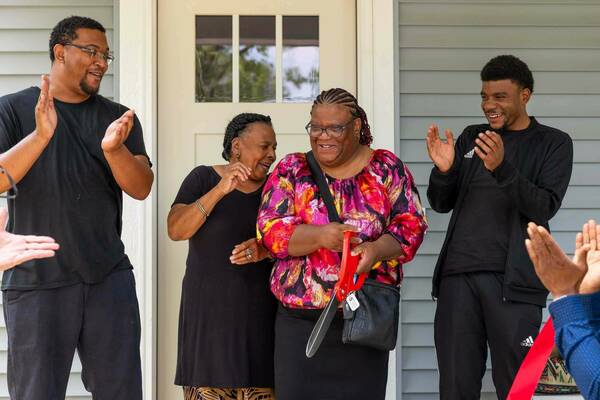Eck Institute investigator to strengthen postpartum care for Indiana mothers
Yenupini Joyce Adams, associate professor of the practice and maternal health lead for the Eck Institute for Global Health at the University of Notre Dame, is partnering with Beacon Health System to pilot a new, first-of-its-kind postpartum care model in the South Bend-Elkhart community.
The Focused Postpartum Care (Focused-PPC) project will serve as many as 104 women and their children in Elkhart, Marshall and St. Joseph counties — with critical support from Anthem Blue Cross and Blue Shield Foundation in the form of a two-year, $310,595 grant.
The project, previously recognized with grants from the Indiana Clinical and Translational Sciences Institute, the Kellogg Institute for International Studies and the Ford Program in Human Development Studies and Solidarity, is featured alongside the Eck Institute’s Pop Up Pregnancy & Family Village program in the latest What Would You Fight For? campaign, which will air at halftime of Saturday’s Notre Dame-Boise State football game.
Based in Indianapolis, Anthem Blue Cross and Blue Shield Foundation is the philanthropic arm of Anthem Blue Cross Blue Shield Indiana, committed to addressing the physical, behavioral and social needs of vulnerable populations.
“By providing sustained support and monitoring throughout that critical first year, we can help prevent postpartum depression, identify health concerns early and ultimately save lives.”
“Whole health begins with ensuring mothers and babies have the care and support they need during the most critical stages of life,” said Anthem Indiana Medical Director Kirsten Kahle. “Postpartum care is far too often overlooked, yet it plays a vital role in preventing complications, supporting maternal mental health and giving children the healthiest possible start. We’re committed to investing in innovative, collaborative models like the Focused Postpartum Care project that can serve as blueprints for addressing complex health issues.”
Led by Adams, whose research focuses on postpartum care, maternal health and maternal mortality, the Focused-PPC project falls under one of the Eck Institute’s core areas of work, the Maternal, Newborn and Child Health Initiative.
First introduced in Ghana, the Focused-PPC project is a group postpartum care, education and support model for postpartum women extending from delivery to one year post-birth.
Participants receive an initial postpartum visit within two weeks of giving birth; a routine postpartum visit at six weeks; additional monthly visits for 12 months; vital signs measurement at every visit; screenings for mental health and social drivers of health at certain intervals; and standardized education on various topics based on time frame after delivery, following a specially designed education guide.
The current standard for postpartum care in the U.S. is one doctor visit at six weeks after delivery.
“Six weeks is no longer sufficient,” Adams said. “If we want to improve maternal mortality and morbidity, we must prioritize quality postpartum care and education until one year post-birth.”
In Ghana, women who participated in the project had lower stress levels than those who did not. They were less likely to experience postpartum depression and more likely to follow healthy eating habits, recognize post-birth warning signs and adopt family planning methods. Due to monitoring, cases of high blood pressure among the participants decreased over time.
Postpartum care is especially critical in Indiana, which ranks low for maternal and infant mortality. Low-income and disadvantaged women and children are especially at risk.
“Focused postpartum care has the potential to significantly improve maternal and infant health outcomes in our community,” said Kimberly Green Reeves, vice president of community impact and partnerships for Beacon Health System. “By providing sustained support and monitoring throughout that critical first year, we can help prevent postpartum depression, identify health concerns early and ultimately save lives.”
For more information, visit yjadams.nd.edu/projects/focused-postpartum-care-project-focused-ppc/.
Latest ND NewsWire
- Researchers deconstruct chikungunya outbreaks to improve prediction and vaccine developmentThe symptoms come on quickly — acute fever, followed by debilitating joint pain that can last for months. Though rarely fatal, the chikungunya virus, a mosquito-borne illness, can be particularly severe for high-risk individuals, including newborns and older adults. While the virus is common…
- Gen. Martin Dempsey to speak at Notre Dame Forum event on ‘Hope, Global Stability and the Role of the United States’Gen. Martin Dempsey, the retired 18th chairman of the Joint Chiefs of Staff, will join University President Rev. Robert A. Dowd, C.S.C., for a fireside chat at 4 p.m. Friday (Oct. 10), as part of the 2025-26 Notre Dame Forum. The discussion, titled “Hope, Global Stability and the Role of the United States,” is part of the exploration of this year’s Notre Dame Forum theme, “Cultivating Hope.” It will take place in Rooms 215/216 of McKenna Hall and will also be livestreamed. The event is free and open to the public.
- University of Notre Dame joins the Global Coalition of Ukrainian StudiesThe University of Notre Dame has joined the Global Coalition of Ukrainian Studies after signing a memorandum of cooperation, formalized Sept. 24, at the Ukrainian Institute of America in New York City. Notre Dame joined four other American institutions that were also publicly welcomed to the coalition at this event: Arizona State University, Columbia University, Manor College and the Shevchenko Scientific Society.
- One year later, Inauguration Build a ‘dream come true’ for Habitat familiesOne year later, work on Inauguration Build 2024 is complete, offering shelter and so much more to five local families.
- Alumni Association and YoungND honor 2025 Domer DozenThe Notre Dame Alumni Association announced its 2025 Domer Dozen cohort, honoring 12 graduates ages 32 and younger for excellence in their contributions in learning, service, faith and work — the core pillars of the association’s mission.
- Faculty receive prestigious early career awards from National Science FoundationDuring the 2024-25 academic year, four researchers in the University of Notre Dame’s Colleges of Engineering and Science received early-career awards from the National Science Foundation.













